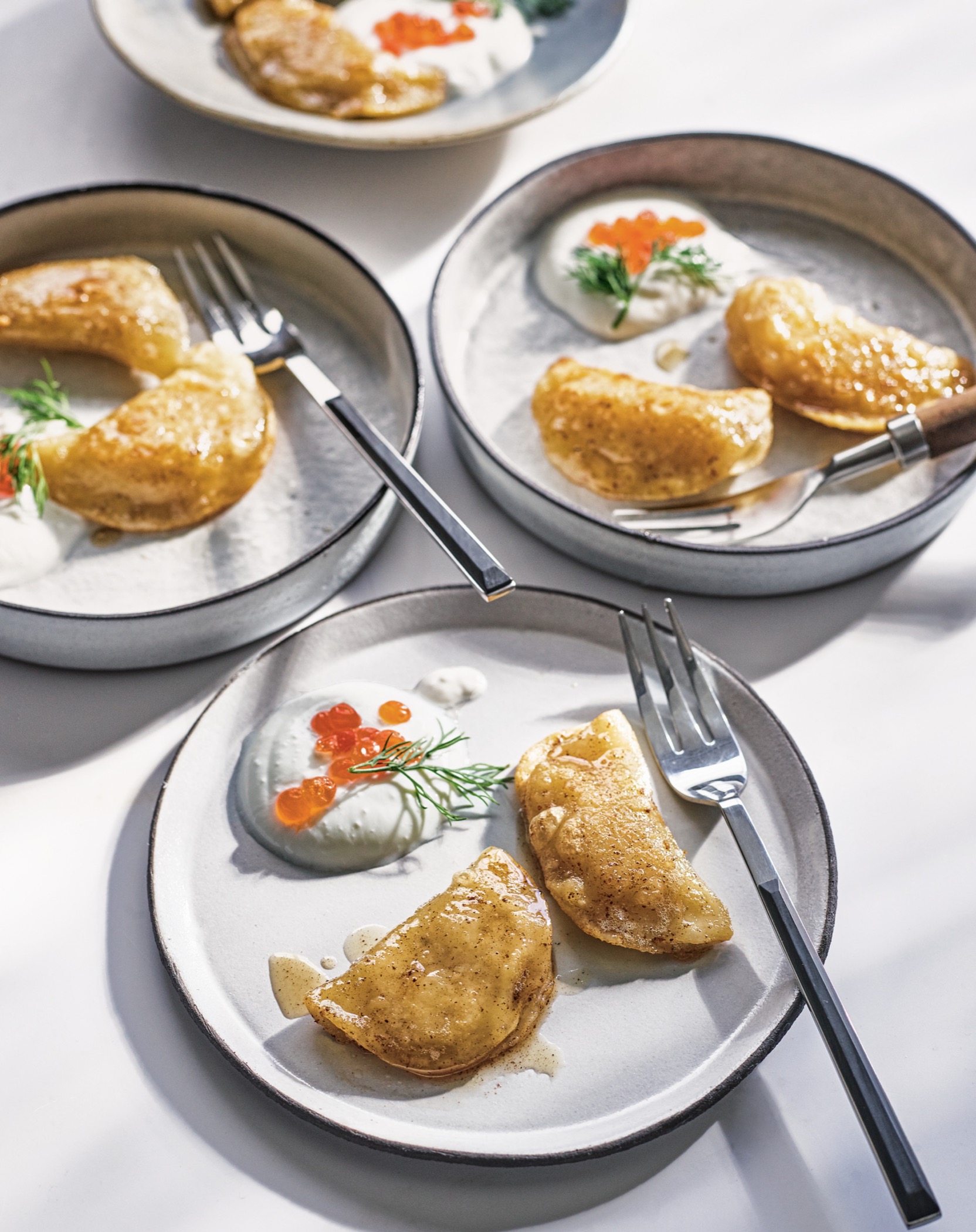Potato Vareniki with Brown Butter and Drunken Salmon Roe
“Think of these as the Russian wontons,” Sabina Valdman told me as we rolled out the dough for the vareniki she ate as a child in Riga, Latvia. Flour and water enriched with an egg yolk and a knob of butter created a pliant pasta that rolled like a dream, ready to be filled with a peppery mixture of potatoes and onions. Once Valdman’s family moved to Israel in 1988—three years before communism fell and nearly a million former Soviets began their exodus to Israel—dishes like these kept them connected to their own life as they forged a new one that included being open about being Jewish for the first time in their lives. “We never talked about it in Russia,” said Valdman, a well-known chef and TV cooking-competition veteran who did everything she could to lose her Russian accent and immerse herself in Israeli culture upon arrival. “That included the food.” But over the past few years, perhaps because she got married and is now the mother of a newborn baby, she has found herself returning to her childhood for inspiration. That includes vareniki, which means “things cooked in boiling water” in Russian. After we filled, crimped, and cooked the dumplings, we riffed on the more traditional serving style—straight out of the water with a dollop of butter, and dill—by toasting them in browned butter and bedazzling them with salmon eggs we soaked in vodka. “What can I say?” said Valdman. “There’s no escaping home.”

Makes 25 dumplings
Active Time: 1 hour 10 minutes
Total Time: 2 hours 15 minutes

DOUGH
1½ cups all-purpose flour, plus more for kneading
½ teaspoon kosher salt
½ cup boiling water
1 stick (½ cup) unsalted butter, at room temperature
1 large egg yolk
FILLING
2 medium Russet potatoes (1 pound), scrubbed
7 tablespoons unsalted butter, at room temperature
1 large onion, thinly sliced
¾ teaspoon kosher salt, plus more to taste
½ teaspoon freshly ground black pepper
ASSEMBLY
3 tablespoons salmon roe (optional)
2 tablespoons vodka (optional)
White vinegar, sour cream, and fresh dill, for serving
Make the dough: In a medium bowl, combine 1 cup of the flour and the salt with the water and the butter and stir until combined. Stir in the remaining ½ cup flour, form a well in the center, add the yolk to the well, and use your hands to knead the egg into the dough. Transfer the dough to a lightly floured surface and knead the dough until smooth, 1 minute. Place the dough in a floured bowl, cover it with plastic wrap or a clean kitchen towel, and let it rest for 45 minutes and up to 1 hour.
While the dough is resting, make the filling: Add the potatoes to a medium saucepan and cover with cold water. Bring to a boil over medium-high heat, reduce the heat to medium (the water should still be bubbling and rolling but doesn’t need to be raging), and boil until the potatoes can easily be pierced with a fork, 25 to 30 minutes. Drain the potatoes and cool.
While the potatoes are cooking, in a large skillet sauté 3 tablespoons of the butter with the onions over low heat, stirring occasionally, until the onions are translucent, 20 minutes. Raise the heat slightly and continue to cook, stirring occasionally, until the onions are deep golden but not burnt, another 20 to 25 minutes. Transfer the onions to a bowl (save the skillet with any onion bits for later). Peel the cooled potatoes, add them to the bowl with the onions, add the salt and pepper, and mash until smooth.
Gently stir the salmon roe and vodka together in a small bowl and refrigerate, if using.
Bring a large pot of generously salted water to a boil over medium-high heat. Flour a large work surface, uncover the dough, and roll it out into a large, thin circle about 20 inches in diameter; the dough should be pliable and easy to roll. Use a round 3-inch cookie cutter to cut out about 25 circles from the dough.* Place 1 tablespoon of the filling in the center of each round, then pull up the sides of the circle, stretching the dough to enclose the filling and creating a half-moon shape. Pinch with your fingers and crimp to seal.** Drop the vareniki into the water and cook them until they float and the water returns to a boil, 3 to 4 minutes. Drain the vareniki in a colander, removing as much liquid as possible.
Finish the vareniki and assemble: Add 2 tablespoons of the remaining butter to the skillet you used to cook the onions. Brown the butter over medium-low heat until small flecks appear, 3 to 4 minutes. Add half the vareniki and cook until they are slightly crisped and golden, 2 to 3 minutes per side. Using an offset spatula, transfer the vareniki to a platter and repeat with the remaining vareniki and butter. Drizzle with a tiny amount of white vinegar, and top with sour cream, vodka-soaked salmon roe (if using), and dill.
*Instead of rerolling the dough into more vareniki, gather up the scraps and throw the freeform noodles straight into the hot water, cook them for 1 to 2 minutes, drain them, and toss them with butter, cinnamon, and sugar. Dessert is served.
**At this point you can freeze the uncooked vareniki on a lightly buttered sheet pan in a single layer, then pop them into a resealable plastic bag. To cook them, drop them directly from the bag into boiling water and cook according to the instructions above.
